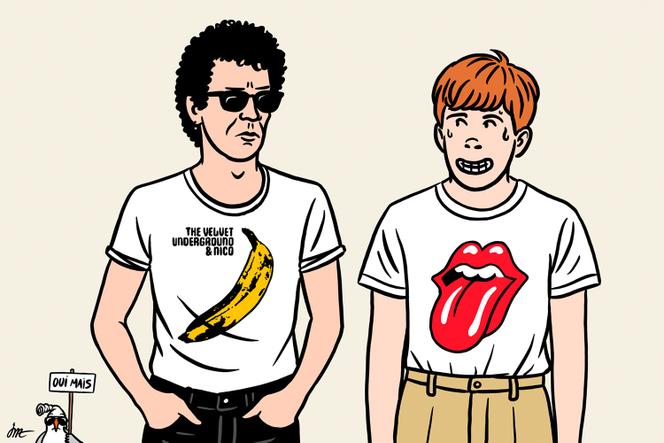


With the summer reunion of Oasis and the many textile-marketing operations it has spawned, the debate over band T-shirts has returned to center stage. Beloved by fans, collected by nerds, appropriated by show-offs, and mocked by the general public, these shirts are far from ordinary garments.
Invented in 1956 by an Elvis fan club looking to raise some money by selling shirts bearing his likeness and later industrialized by concert promoter Bill Graham, the band T-shirt has spanned the decades with a particularly unpredictable sense of style. Sometimes, it has appeared with a simple logo or has been beautifully screen-printed and worn by time, but more often it has been slashed with fluorescent typefaces and faces haphazardly reproduced with puff ink.
However garish it may be, the band tee defies purely aesthetic judgment. Whether worn by a teenager clinging to their favorite band to navigate an identity crisis or by a 50-something overplaying rebellious dress codes to counter the effects of hair loss on their once wild mane, its value lies above all in its role as a marker of identity. Unlike those ghastly logo pieces from luxury brands, which flaunt purchasing power and social status, the band tee reveals one's culture and personal history.
This is the heart of the matter. Once sold exclusively at concerts, the band T-shirt long served as a certificate of authenticity for fans seeking distinction and recognition. Today, it circulates so freely that it no longer guarantees the legitimacy of its wearer. Subject to the whims of trends, the ravages of buying and reselling, it can even end up on the shoulders of passersby who know nothing of the artist whose name they display.
While we may stop short of demanding that every person we see name three songs by the band on their tee as a sort of entry test, it is hard not to feel that wearing one purely for aesthetic reasons, with no emotional attachment whatsoever, is nothing more than a charade – in fact, a form of imposture, or perhaps even a gentle kind of cultural appropriation. But never mind, let's focus on what matters: Oasis is back together.
Translation of an original article published in French on lemonde.fr; the publisher may only be liable for the French version.
